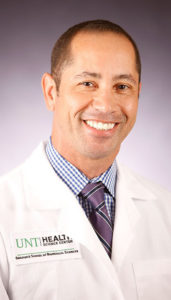Protecting astronauts’ immune systems during spaceflight
By Alex Branch
Long-time collaborators UNT Health Science Center and Langston University have teamed with NASA on a five-year project to study the effects of reduced gravity on astronauts’ immune systems during spaceflight.

The project, funded by a $4.5 million NASA grant, also is intended to promote diversity in the field of space biomedicine, said Harlan Jones, PhD, Assistant Professor in the UNTHSC Institute of Molecular Medicine and Director of the Center for Diversity and International Programs. Students from Langston, the state of Oklahoma’s only historically African-American university, have for years participated in the Health Science Center’s 10-week summer internship research program.
The NASA project will focus on natural approaches that could help avoid dysregulation of astronauts’ immune systems.
During space flight, some of astronauts’ immune cells can become less active while others become more active, according to a 2014 NASA study. Reduced cell activity can prevent the immune system from generating appropriate responses to threats, while heightened activity can result in increased allergy symptoms or persistent rashes. On a long spaceflight, even a cold or the flu can be risky business for astronauts, the study reported.
Dr. Jones and Langston faculty and students will have opportunities to work on the project with NASA scientists in laboratories at Johnson Space Center in Houston.
“I’m an immunologist, and the faculty at Langston are very interested in developing natural products that could perhaps improve the performance of astronauts’ immune system on long space flights, such as NASA’s goal of a mission that reaches Mars,” said Dr. Jones, co-investigator on the project. “It’s a unique research opportunity for both faculty and students.”
The project also supports NASA’s Office of Education goal of ensuring that underrepresented and underserved students participate in NASA education and research projects in their pursuit of science, technology, engineering and math (also known as STEM) careers.
UNTHSC provides Langston University faculty and students with professional development opportunities, mentorship, grant-writing training and access to a doctoral program in biomedical research. Dr. Jones also is assisting Langston University with development and strengthening the university’s research labs, also funded by the NASA grant.
“Participation in such as project ensures that we prepare an ever-increasing diverse demographic with the demand for a talented pool to compete in the global STEM career workforce,” Dr. Jones said.




Social media